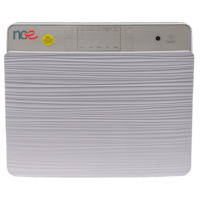-
Filter By Stock
- In Stock (5)
Filter By Brand
- NCE (5)
Dust Reduction Systems & Air Purifiers for Caravans
Keep your caravan interior cleaner with dust reduction systems that pressurise the cabin and prevent dust entry during travel. Designed for off-road use, these rooftop units help reduce dirt, allergens, and airborne particles.
Caravan Dust Reduction Systems Australia: Pressuriser Solutions for Cleaner Travel
Red dust is part of caravanning in Australia. Long stretches of unsealed roads and bulldust tracks make it impossible to avoid. The real challenge is keeping that dust outside your van. Once fine particles get inside, they coat bedding, electronics, food preparation surfaces and appliances. Over time, dust also wears down hinges, drawer runners and seals. A dust reduction system solves this by gently forcing filtered air into the caravan while driving. The slightly higher internal pressure pushes air outward through natural gaps, stopping dust from being sucked in.
HTP 12V Cabin Pressure System
The HTP 12V Cabin Pressure System is engineered for Australian conditions and remains the leading choice for dust prevention. It fits a standard 315 mm x 315 mm roof hatch cut-out, so most caravans can accept it without structural changes. A powerful 12V fan draws outside air through a replaceable paper filter and stainless mesh screen, delivering clean air into the van. The unit weighs around 4 kg, has a UV resistant housing and operates reliably from minus 20°C to 55°C. It is IP67 rated, meaning it is dustproof and waterproof to one metre for 30 minutes. It is also shock and flame resistant, built to withstand corrugations and outback extremes.
Why not just rely on sealing?
Even the best sealed vans still suck in fine dust when driving. Seals compress, age and shift over time. Suction created by the vehicle moving at speed pulls dust through the smallest pinholes. A pressuriser reverses the pressure relationship. Instead of air rushing in, filtered air is always moving out. This means sealing alone can never match the protection offered by a dedicated dust reduction system. The HTP is the most reliable way to protect interiors, food, appliances and health.
Dust protection options compared
| Option | How it works | Advantages | Limitations |
|---|---|---|---|
| HTP 12V Cabin Pressure System | Fan powered positive pressure with replaceable filter | Works at all speeds, designed for Australian caravans, low power draw, tested to IP67 | Requires roof cut-out and 12V wiring |
| Sealing only | Foam, silicone and gaskets to close gaps | Reduces large entry points, always worth doing | Fine dust still enters, requires constant upkeep |
| Passive vents | Ram-air effect forces air at speed | No wiring needed, simple design | Dependent on driving speed, limited filtration |
Placement, wiring and airflow
The HTP unit is best mounted in the forward roof section where airflow is clean and unobstructed by solar panels or air conditioners. It is powered by a fused 12V supply and draws minimal current, making it ideal for solar and lithium battery setups. When fitted, windows and hatches should be closed during travel for best results. The filter element is accessible from inside the van and can be swapped in minutes without tools. Many travellers carry a spare filter for long outback trips, ensuring performance is never compromised.
What to expect in real conditions
| Condition | Without dust system | With HTP system |
|---|---|---|
| Bulldust track | Fine dust coating benches, bedding and electronics | Interior remains clean, filter captures red dust, reduced cleaning at camp |
| Corrugated road | Dust shakes through seals, drawers and fridge gaskets | Positive pressure holds seals firm, dust ingress significantly reduced |
| Crosswinds | Dust sucked in from leeward side | Fan maintains steady airflow, pressure equalises, dust still blocked |
Regular maintenance includes tapping or vacuuming the pre-screen and replacing the paper element when airflow reduces or it becomes visibly clogged.
Safety and performance notes
The HTP is not just a filter and fan. It is a complete safety feature for anyone touring remote Australia. By keeping fine dust out, it helps prevent respiratory issues for allergy and asthma sufferers. It also protects sensitive appliances such as fridges, inverters and electronics that are easily damaged by dust build-up. The Push-to-Power restart function ensures that after long storage or a flat battery, the unit is back online instantly. Unlike cheaper alternatives, the HTP is fully tested to IP67, giving confidence in storms, rain and water crossings. The rugged design means you can rely on it for years of service, making it a smart long-term investment rather than a short-term accessory.
Australia’s trusted source for dust reduction systems
The HTP Cabin Pressure System is the most effective way to protect your caravan from dust. Designed in Australia for Australian conditions, it is durable, efficient and proven. Explore the HTP 12V Cabin Pressure Unit today or see more touring essentials at Home & RV. For installation tips and maintenance advice, read our Caravan Dust Reduction Systems Guide.







